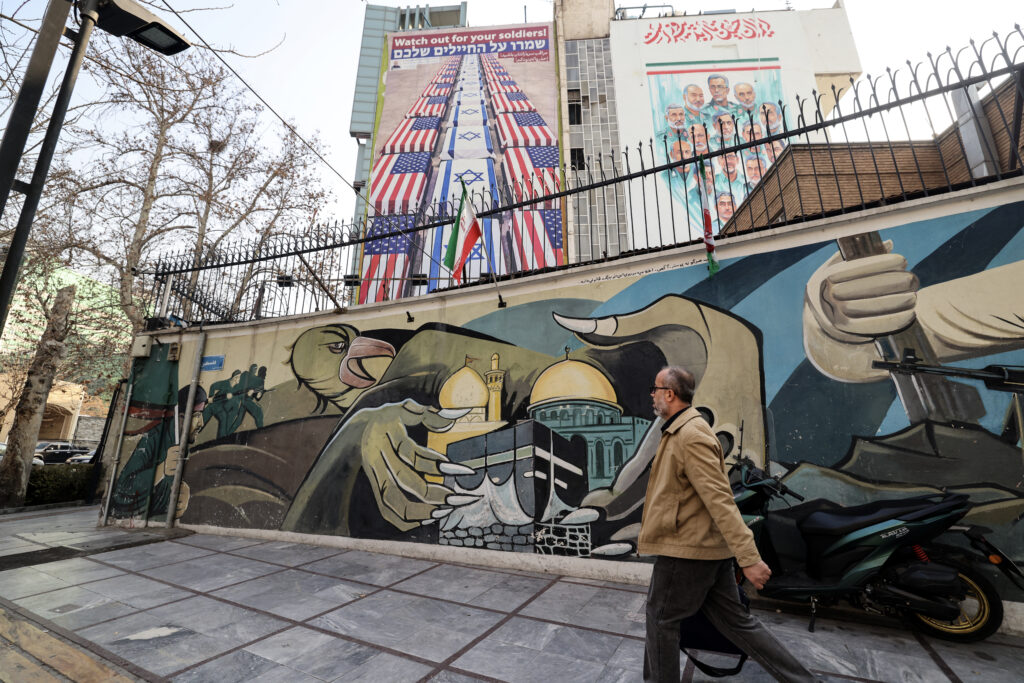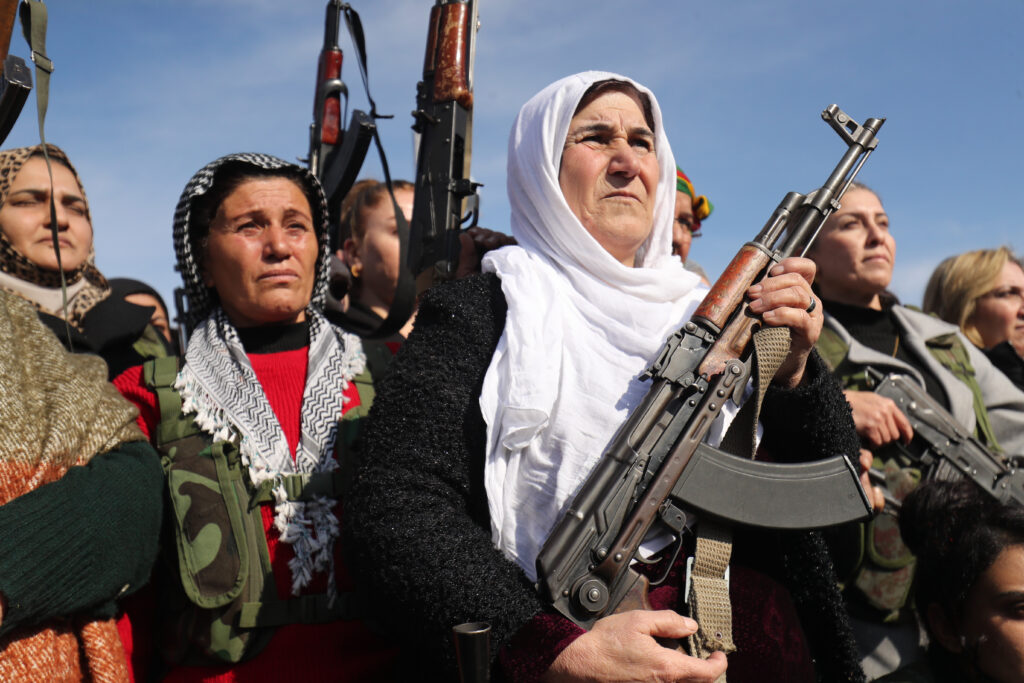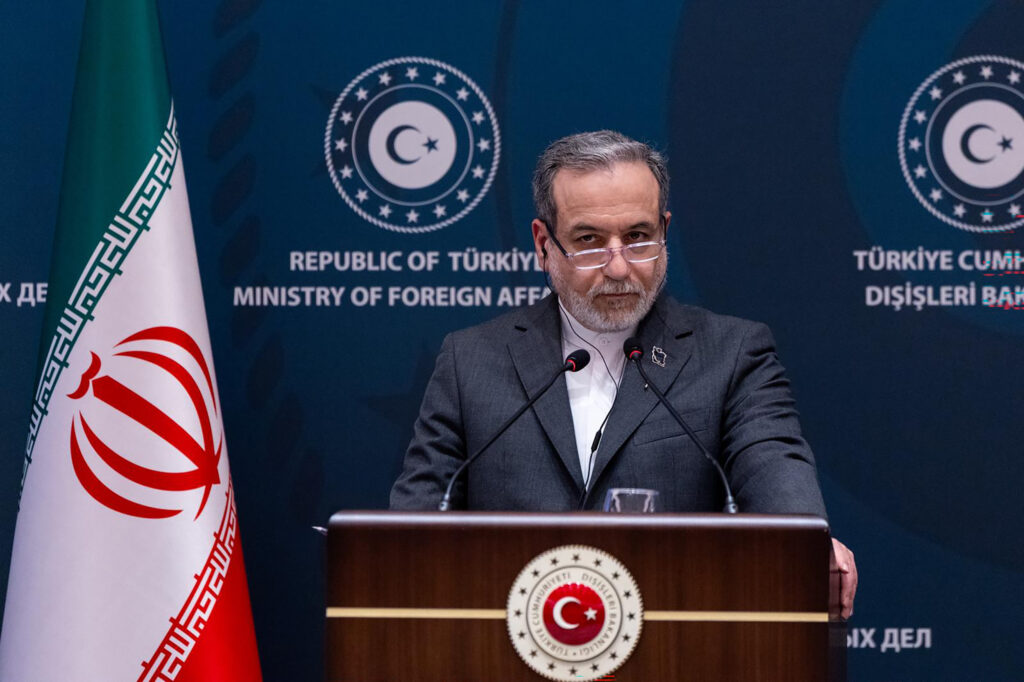AFP Asia Business
Trump expects Iran to seek deal to avoid US strikes
President Donald Trump predicted on Friday that Iran would seek to negotiate a deal rather than face American military action, despite Tehran warning that its arsenal of missiles would never be up for discussion.”I can say this, they do want to make a deal,” Trump told reporters in the Oval Office. Asked if he had given Iran a deadline to enter talks on its nuclear and missile programs, Trump said “yeah, I have,” but refused to say what it was.”We have a large armada, flotilla, call it whatever you want, heading toward Iran right now,” Trump said, referring to a US naval carrier group in waters off Iran.”Hopefully we’ll make a deal. If we do make a deal, that’s good. If we don’t make a deal, we’ll see what happens.”Trump cited what he said was Iran’s decision to halt the executions of protesters — after a crackdown in which rights groups say more than 6,000 people were killed — as evidence to show Tehran was ready to negotiate.- ‘Doing the right thing’ -Washington’s allies in the region are concerned that any US strike on Iran could cause instability and economic chaos.One senior Gulf official in touch with the Trump administration said that the United States was closely guarded on what it has planned.”We hope that whatever happens, it is going to lead to stability. That outcome could be reached by the Iranians doing the right thing, and we hope that happens,” the official said, speaking on condition of anonymity.Meanwhile, the head of Iran’s top security body — secretary of the Supreme National Security Council Ali Larijani — met Tehran’s ally Russian President Vladimir Putin in Moscow.No details of their talks emerged, but Moscow has offered to mediate between Washington and Tehran.Iran’s top diplomat said Friday that his country’s missile and defense capabilities would “never” be on the negotiating table.Foreign Minister Abbas Araghchi said Tehran was “ready to begin negotiations if they take place on an equal footing.”But, he emphasized, “Iran’s defensive and missile capabilities will never be subject to negotiation,” adding there were no plans to meet with US officials on resuming talks.US news site Axios reported this week that Washington officials say any deal would have to include a cap on Iran’s arsenal of long-range missiles, the removal of enriched uranium from the country and a ban on independent enrichment. Serhan Afacan, director of IRAM, the Ankara-based Centre for Iranian Studies, told AFP that trying to link a nuclear deal with other issues would likely “be impossible.” “For now, the ballistic missile program remains a red line, as it sits at the core of Iran’s defense architecture,” he said. – ‘Reducing’ tensions -Iran has warned that it would respond instantly with missile strikes against US bases, ships and allies, notably Israel.”We are not limiting the geography of confrontation to the sea alone and have prepared ourselves for broader and more advanced scenarios,” the head of Iran’s Defence Council, Ali Shamkhani, said Friday, according to the Tasnim news agency.Speaking at a joint news conference in Istanbul with Araghchi, Turkish Foreign Minister Hakan Fidan said Israel was pushing for the United States to attack Iran, and urged Washington to “not allow this to happen.”Iran has blamed the United States and Israel for the protests that erupted in late December over economic grievances and peaked on January 8 and 9, accusing the two countries of fueling a “terrorist operation” that turned peaceful demonstrations into “riots.”The US-based Human Rights Activists News Agency (HRANA) said it has confirmed 6,563 people killed in the demonstrations, including 6,170 protesters and 124 children, as internet restrictions imposed on January 8 continue to hinder access to information inside the country. But rights groups warn the toll is likely far higher, with estimates in the tens of thousands. Iranian authorities give a toll of more than 3,000 deaths in the protests, but say the majority were members of security forces or bystanders killed by “rioters.” burs-sw/dc/bgs/abs/acb
Syria govt, Kurds reach comprehensive agreement
Syria’s government and Kurdish forces reached a comprehensive deal on Friday to gradually integrate the Kurds’ military and civilian institutions into the state, a step Washington described as a “historic milestone”.In recent weeks, the Kurdish-led Syrian Democratic Forces (SDF) have ceded vast areas of Arab-majority land to government forces.It was territory they held for years, having seized it in fierce battles against the Islamic State jihadist group during a campaign backed by a US-led coalition.The new deal, the text of which was released by both sides, “seeks to unify Syrian territory and achieve the full integration” of the Kurdish-majority region.It maintains an ongoing ceasefire and introduces a “gradual integration” of the Kurdish forces and administrative institutions.Speaking to Kurdish television, SDF leader Mazloum Abdi said the deal would be implemented on the ground from February 2 and that both sides would pull forces back from frontline positions in the town of Kobane and the al-Jazeera area in the north east of the country. “A limited internal security force will enter the security districts in Hasakeh and Qamishli to implement the integration agreement in practice,” he said. “No military forces will enter any Kurdish city or town.”The SDF was a key partner of Washington in the anti-IS campaign, but since the toppling of Syria’s longtime ruler Bashar al-Assad in late 2024, the United States has drawn close to the new authorities in Damascus.The US has recently declared the need for its Kurdish alliance largely over, and has sought to mediate talks between the government and the Kurds. The new agreement, announced by both the SDF and Syrian state television, follows an understanding reached earlier this month on the future of the majority-Kurdish areas of Hasakeh province and Kobane.It appears to include at least some of the Kurds’ demands, like the establishment of brigades of SDF fighters in Kurdish-majority areas.Damascus had previously rejected the idea of ethnically based military units.In a video conference Friday, Kurdish politician and key negotiator Elham Ahmad said the new deal enforces a “permanent ceasefire”.She added that the US and France were the guarantors of the deal, but talks were ongoing over the details of the integration process.Raman Sido, a resident of the Kurdish city of Qamishli, said the deal’s main benefit was that it would “defuse the Kurdish-Arab tension and eliminate the looming spectre of conflict”.But he warned that it still lacked clarity on implementation and the system of administration.- Government control -During Syria’s civil war, the Kurds were able to carve out a de facto autonomous region that expanded as they advanced against IS.While Kurdish forces had tried to protect their gains, Syria’s new Islamist authorities want to extend state control across the country.Talks between the two began swiftly after Assad was forced out, but progress stalled and there were repeated bouts of violence, culminating in the recent army offensive.Syria’s state media quoted a government source as saying that according to the new deal, “the state will assume control over all civilian and governmental institutions, as well as (border) crossings”.”No part of the country will remain outside its control,” the source added. For years, Kurdish forces have controlled long stretches of the border with Turkey to the north and Iraq to the east. With several crossings closed, most traffic passed through one main gateway with Iraqi Kurdistan.The deal lays out the integration of three SDF brigades into the Syrian army in the Kurdish-majority areas of Hasakeh.Another brigade will be created for the pocket of Kobane — once a symbol of Kurdish fighters’ victory against IS — which is around 200 kilometres (125 miles) from Hasakeh.The deal also involves the integration of administrative institutions into those of the Syrian state and the retention of existing employees.- ‘Vague on core questions’ -Lars Hauch, an expert on Syria at Conflict Mediation Solutions, told AFP that the deal “suggests that remnants of the SDF will continue to exist for the time being, but the text remains vague on core questions of administrative and security decentralisation”. “Rather than a done deal, this looks more like an advanced memorandum of understanding, whose sequencing and specifics will need to be negotiated in what has been a largely performative process in the past.” US envoy to Syria Tom Barrack said on X that the deal was a “historic milestone” that “reflects a shared commitment to inclusion, mutual respect, and the collective dignity of all Syrian communities”.But Ahmad, the Kurdish politician, said Washington had “played a negative role” by deeming the SDF’s mission against IS to be over, adding she hoped the US would “play a fair role for everyone in Syria”.French President Emmanuel Macron welcomed the deal and said France supported its full implementation.But some Kurds remained wary.Shop owner Abu Ali, 40, who withheld his full name, told AFP “we don’t trust this government”, pointing to massacres blamed on government forces against other minorities last year.”Look at what they did in Sweida, and the coast,” he said.
Trump predicts Iran will seek deal to avoid US strikes
President Donald Trump predicted on Friday that Iran would seek to negotiate a deal rather than face American military action, despite Tehran warning that its arsenal of missiles would never be up for discussion.”I can say this, they do want to make a deal,” Trump told reporters in the Oval Office. Asked if he had given Iran a deadline to enter talks on its nuclear and missile programs, Trump said “yeah, I have”, but refused to say what it was.”We have a large armada, flotilla, call it whatever you want, heading toward Iran right now,” Trump said, referring to a US naval carrier group in waters off Iran. “Hopefully we’ll make a deal. If we do make a deal, that’s good. If we don’t make a deal, we’ll see what happens.”Trump cited what he said was Iran’s decision to halt the executions of protesters — after a crackdown in which rights groups say more than 6,000 people were killed and which triggered the latest round of threats between the long-time foes — as evidence to show Tehran was ready to negotiate.The US president brought the temperature down late on Thursday, saying he hoped to avoid military action and that talks with Iran were on the cards, having pressured Tehran for a deal on its nuclear programme, which the West believes is aimed at making an atomic bomb. Nevertheless, Iran’s top diplomat said Friday that his country’s missile and defence capabilities would “never” be on the negotiating table.Foreign Minister Abbas Araghchi said Tehran was “ready to begin negotiations if they take place on an equal footing, based on mutual interests and mutual respect”, during a visit to Turkey, which is leading a diplomatic push to mediate between Tehran and Washington. But, he emphasized, “I want to state firmly that Iran’s defensive and missile capabilities will never be subject to negotiation”, adding that no plans were in place to meet with US officials about resuming talks. On Monday, the news site Axios reported that US officials say any deal would have to include a cap on Iran’s arsenal of long-range missiles, the removal of enriched uranium from the country and a ban on independent enrichment. Serhan Afacan, director of IRAM, the Ankara-based Centre for Iranian Studies, told AFP that trying to link a nuclear deal with other issues would likely “be impossible”. “For now, the ballistic missile programme remains a red line, as it sits at the core of Iran’s defence architecture,” he said. – ‘Reducing’ tensions -Turkish Foreign Minister Hakan Fidan said restarting talks between Tehran and Washington over Iran’s nuclear programme was “vital for reducing regional tensions”. Speaking at a joint news conference in Istanbul with Araghchi, he said Israel was pushing for the United States to attack Iran, and urged Washington to “act with common sense and not allow this to happen”. Iran has blamed the United States and Israel for the protests that erupted in late December over economic grievances and peaked on January 8 and 9, accusing the two countries of fuelling a “terrorist operation” that turned peaceful demonstrations into “riots”. Araghchi was also due to meet with Turkish President Recep Tayyip Erdogan, who told his Iranian counterpart Masoud Pezeshkian by phone earlier Friday that Turkey was “ready to assume a facilitating role between Iran and the United States to de-escalate the tensions”. Pezeshkian, meanwhile, said the success of diplomacy depended on the “goodwill of the parties involved and the abandonment of belligerent and threatening actions in the region”, his office said.As well as his diplomatic efforts to stave off a confrontation, Erdogan has also been pushing Washington for a high-level trilateral meeting, a Turkish diplomat said, confirming local media reports.- ‘Consequences’ -Other regional actors have joined calls for diplomacy, including Gulf states, some of which host US military sites, and Tehran’s ally Russia. Pezeshkian urged coordinated regional efforts to reduce tensions in a call with UAE President Sheikh Mohamed bin Zayed Al Nahyan, saying Iran has “never sought war” but any aggression against it would “receive an immediate and firm response”. The US-based Human Rights Activists News Agency (HRANA) said it has confirmed 6,479 people killed in the demonstrations, including 6,092 protesters and 118 children, as internet restrictions imposed on January 8 continue to hinder access to information inside the country. But rights groups warn the toll is likely far higher, with estimates in the tens of thousands. Iranian authorities acknowledge that thousands were killed during the protests, giving a toll of more than 3,000 deaths, but say the majority were members of the security forces or bystanders killed by “rioters”. burs-sw/dc/amj
Trump says Iran wants deal, US ‘armada’ larger than in Venezuela raid
President Donald Trump said Thursday he believed Tehran wanted to make a deal to avoid military action, adding that the US “armada” near Iran was bigger than the one he dispatched to topple Venezuela’s leader.”We have a large armada, flotilla, call it whatever you want, heading toward Iran right now, even larger than what we had in Venezuela,” the Republican president told reporters in the Oval Office.”Hopefully we’ll make a deal. If we do make a deal, that’s good. If we don’t make a deal, we’ll see what happens.”Asked if he had given Iran a deadline to make a deal on its nuclear program, ballistic missiles and other issues, Trump said “yeah I have” but added that “only they know for sure” what it was.Trump, however, cited what he said was Iran’s decision to halt executions of protesters — after a crackdown in which rights groups say more than 6,000 people were killed — as evidence to show Tehran was ready to comply.”I can say this, they do want to make a deal,” Trump said.Trump declined to say whether, if Iran did not reach a deal, he planned a repeat of the dramatic operation in Venezuela in which US forces captured president Nicolas Maduro.”I don’t want to talk about anything having to do with what I’m doing militarily,” he said.




